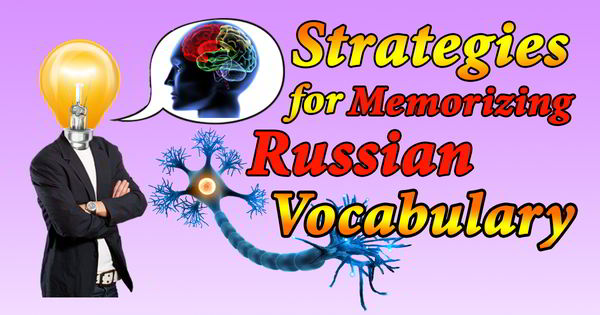Russian Vocabulary: Learn How to Learn It
What is the number of Russian words and phrases that you know? You need 1,500 words and phrases to start speaking the language. 15,000 words phrases present good command of the language. It actually takes quite a long time to study so many words and phrases however there’s nothing impossible.
Here is what you need to do to prepare the method of studying foreign words and phrases the right way.
Basic Rules

Find a separate pocket book (or create a textual content file) to jot down all the new words and phrases you intend to memorize.
Write out the words together with the sentences containing them.
Filter. Try to memorize most widely-used words and phrases first (these that may be present in a dictionary containing 25,000 words).
Try to study established pairs of words. For instance, memorize ‘a breakthrough’ together with ‘to achieve, to make’, ‘clothes’ together with ‘to put on’, and so on.
Memorize new words along with their correct prepositions. Ex.: “смотреть на [sma-TRET’ na]” (to look at).
Now that you understand the basic rules, have a look at some strategies of learning new words and phrases.
Conventional technique

Now read aloud the entire record thoroughly line by line. Then take a ten-minute break and do something else. After that hide the left column and try to remember the spelling and pronunciation of all of the words and phrases from the list. Skip the item if you cannot remember it.
Take another 5-minute break. Then recall all of the words and phrases one more time. Try to focus on the items you couldn’t remember the first time.
Go on till you are able to remember all the words and phrases out of your record (but be sure to stop if you are tired and have some rest).
Review your glossary in 7-10 hours after you’ve memorized the words and phrases. Then review them every 24 hours. The overall number of 4 reviews is required and sufficient.
Important note: It is a good idea to write new words and phrases on 0.8 x 1.2-inch cards with Russian phrases on one side and their equivalents in your mother tongue on the opposite side.
Non-conventional technique

стул [stool] — stool — chair
Now imagine an image that might mix the images of stool and chair. The image needs to be odd, illogical and embody some movement.
For example, think of an old stool that you would like to turn into a chair because you’re tired of sitting on it with your back unsupported. You stand up from your stool and go looking for a chair back. You find it and while you’re thinking how to attach it, it attaches magically itself. Now you have a chair to sit on!
Because of that image the Russian word “стул” will make you remember the English word ‘chair’ (and vice versa) each time you encounter it.
Focus particularly on the motion aspect, as static images are fast to flee your memory. Don’t study more than 25 vocabulary items at a time.
Adjectives, abstract nouns, verbs and adverbs are a bit more difficult to memorize. In this situation you need to extend the sequence of words. Suppose you wish to memorize the word “сила [seela]” (strength). Let’s take the following sequence of words:
“сила” [seela] — seal: “Ah!” — strength
Now imagine that someone is so strong that he is able to lift a 300-pound seal. The seal will be so surprised that he will say: “Ah!” This image should work well.
Inert perception technique
Record an audio of 40 to 50 new Russian words and phrases along with their translations. Listen to the recording as much as you can. Don’t focus too much on what you hear. After quite a lot of playbacks you will memorize all the phrases.
Motor-muscle technique
With this technique you need to really feel and manipulate the object designated by the word you wish to memorize. Thus, if you want to learn the word “цветы [tsve-TY]” (flowers), take some flowers, touch and smell them, and eventually you will put a match to this object. Or if you wish to memorize the word “стирать [sti-RAT’]” (to wash clothes), wash your t-shirt. It’s essential to pronounce the word or phrase in Russian while you repeat these actions a few times.
Do you have any questions? Feel free to put them into the comment section below.
Now you know about various strategies for memorizing Russian vocabulary.
[rating_form id="1"]





